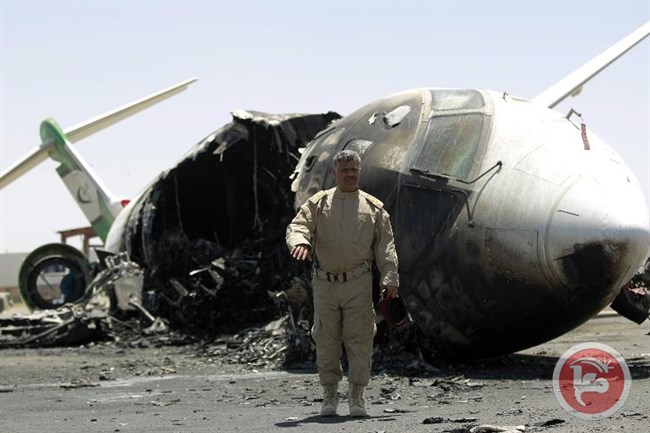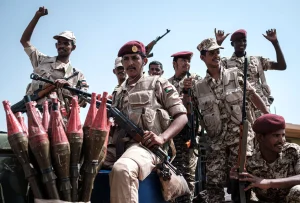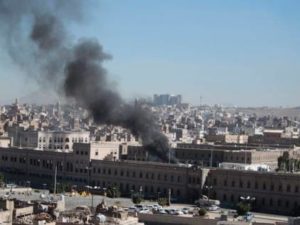Riyadh, 13 Rajab 1436/2 May 2015 (MINA) – Saudi Arabia said its forces killed dozens of Iran-backed rebels from Yemen who launched their first major attack on the kingdom since Saudi-led air strikes began last month.
Three Saudi soldiers also died in the battle after the rebels targeted their observation posts, the defense ministry said, as its army repelled the assault.
There have been deadly skirmishes before but this is the first time the Saudi military has reported a full-scale Houthi attack on its borders, Maan News Agency quoted by Mi’raj Islamic News Agency (MINA) as reporting.
Gulf foreign ministers on Thursday meanwhile rejected a proposal to hold talks on neutral ground between rival Yemeni political forces, while an expert report said Iran has been shipping weapons to the Houthis since at least 2009.
Also Read: Syria, Jordan Condemn Netanyahu’s Visit to Occupied Syrian Buffer Zone
The United Nations is trying to bring an end to the weeks-long air campaign and return to peace talks.
After a meeting in Riyadh, the Gulf ministers insisted that talks between Yemen’s political factions be held in Saudi Arabia, which leads an Arab coalition that has been bombing the Shiite rebels since late March.
Iran has proposed holding UN talks on ending the war in Yemen in a neutral country, one not represented in the coalition.
But in a statement after talks at a Riyadh airbase the six Gulf Cooperation Council states “affirmed their support to intensive efforts by the legitimate Yemeni government to hold a conference under the umbrella of the GCC secretariat in Riyadh.”
Also Read: UNIFIL Reports Over 7,300 Israeli Violations of Lebanese Airspace Since Ceasefire
The conference would be attended by “all Yemeni parties and components supporting legitimacy as well as Yemen’s security and stability,” said GCC secretary general Abdullatif al-Zayani.
Thursday’s meeting aimed to lay the groundwork for a GCC leaders’ summit on Tuesday, which will also be attended by French President Francois Hollande.
The GCC groups regional heavyweight Saudi Arabia along with Bahrain, Kuwait, Oman, Qatar, and the United Arab Emirates.
All but Oman belong to the coalition, whose warplanes pressed their attacks on rebel positions as the ministers met for about three hours in a chandeliered room.
Also Read: Russia Condemns UN Gaza Resolution, Says It Contradicts Palestinian Statehood
‘Pattern of shipments’
The air strikes began in late March when the Houthis and their allies advanced on the main southern city of Aden, where President Abedrabbo Mansour Hadi fled after the rebels seized large parts of the country including Sanaa.
Hadi escaped to Riyadh, which feared an Iran-friendly regime taking control of its southern neighbor.
Iran has denied charges of arming the rebels, called for an end to the strikes and pushed for a negotiated settlement.
Also Read: Israeli Airstrike on Palestinian Refugee Camp in Lebanon Kills 13
But a report by a panel of experts presented to the UN Security Council last week, and seen by AFP, said there has been “a pattern of arms shipments to Yemen by sea that can be traced back to at least 2009.”
The conflict has heightened tensions in the region.
Iran said two of its destroyers sent to the Gulf of Aden had reached the entrance of Bab al-Mandab, a strategic strait between Yemen and Djibouti.
Tehran stressed the warships would stay out of the territorial waters of other countries.
Also Read: UN Security Council Adopts US-backed Resolution to Deploy International Force in Gaza
The coalition has imposed an air and sea blockade on Yemen.
Rulers of GCC countries — many of which have taken part in a US-led air campaign against the Islamic State (IS) group in Iraq and Syria — are preparing to meet US President Barack Obama in mid-May.
In a sign of the gains made by militants who have capitalized on the country’s chaos, IS claimed to have beheaded or shot dead 15 Yemeni soldiers, according to SITE Intelligence Group, a US monitor.
Al-Qaeda has traditionally been Yemen’s dominant militant group, but IS on March 20 claimed its first attacks.
Also Read: UNIFIL Condemns Israeli Tank Fire Targeting Peacekeepers in South Lebanon
Fuel shortages threaten aid efforts
Despite an announcement last week that the campaign was moving into a new phase, daily coalition air strikes continued, hitting Houthi locations in the southern port city of Aden and elsewhere, as pro and anti-government forces battled on the ground.
The rebels have refused to withdraw from seized territory, in defiance of a Security Council resolution imposing an arms embargo and sanctions on their leaders.
The Houthis have allied with troops loyal to former strongman Ali Abdullah Saleh, clashing with militia in Aden known as “Popular Resistance” units loyal to Hadi.
Also Read: Israel Fires on UNIFIL Peacekeepers in Southern Lebanon
The UN says about half of the more than 1,000 people killed since late March were civilians, and millions of people have been affected by the conflict.
Half the population is short of food but a lack of fuel threatens to halt emergency ration deliveries, the UN said.
The GCC urged the international community to rush in more humanitarian aid. (T/P010/R03)
Mi’raj Islamic News Agency (MINA)
Also Read: British Activist Nears End of 6.5-Month Walk From UK to Istanbul to Support Palestinians











![Israeli tanks and APC’s gather by the Israeli – Lebanese border. Amid Israel’s escalating campaign against Hezbollah in Lebanon on September 30, 2024. [Erik Marmor/Getty Images]](https://en.minanews.net/wp-content/uploads/2024/10/IMG_20241001_203226-300x197.jpg)






















 Mina Indonesia
Mina Indonesia Mina Arabic
Mina Arabic